Taxation Law Report: Income Tax Calculation and Case Law Analysis
VerifiedAdded on 2023/04/23
|12
|2948
|101
Report
AI Summary
This taxation law report delves into the intricacies of income tax calculations, deductions, and relevant case law. The report begins with an analysis of personal exertion income, ordinary income, and the application of nexus tests, citing key legal precedents like 'Scott v CT' and 'Dean v FCT.' It then examines specific income sources, including salary, bonuses, clothing allowances, and awards, determining their taxability. The report also explores deductible and non-deductible expenses, such as clothing costs and seminar expenses, referencing cases like 'Mansfield v FCT.' Furthermore, it covers accounting methods, including the receipts and earnings methods, and applies them to Jane's taxation practice and investment property income. The report also includes the treatment of dividends, franking credits, and capital gains, referencing 'FCT v McNeil.' The report concludes with a detailed computation of Jane's net income and a case study analysis of 'FCT v Cooke and Sherden (1980)' which highlights the principles applied in determining taxable income from non-cash benefits.
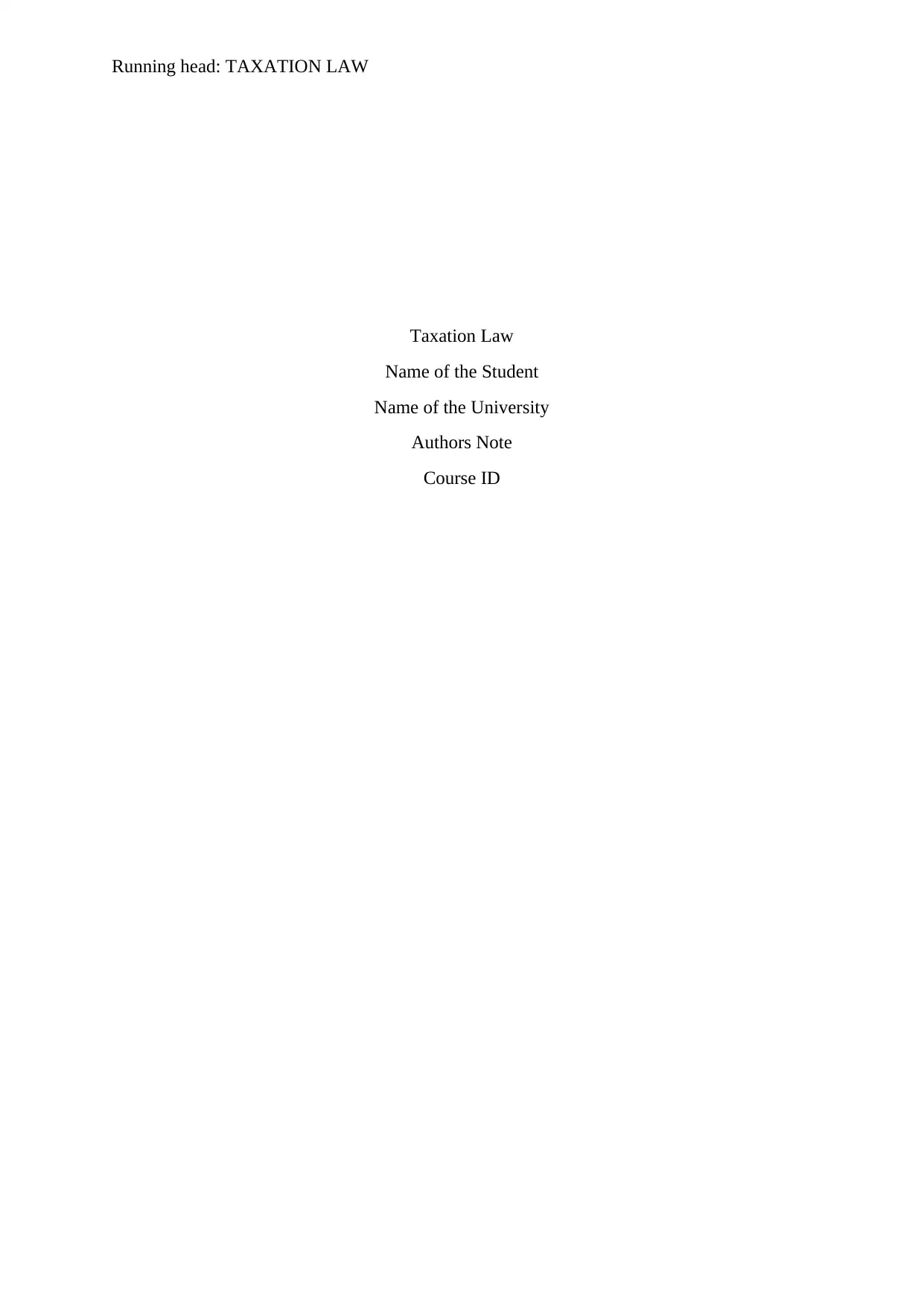
Running head: TAXATION LAW
Taxation Law
Name of the Student
Name of the University
Authors Note
Course ID
Taxation Law
Name of the Student
Name of the University
Authors Note
Course ID
Paraphrase This Document
Need a fresh take? Get an instant paraphrase of this document with our AI Paraphraser
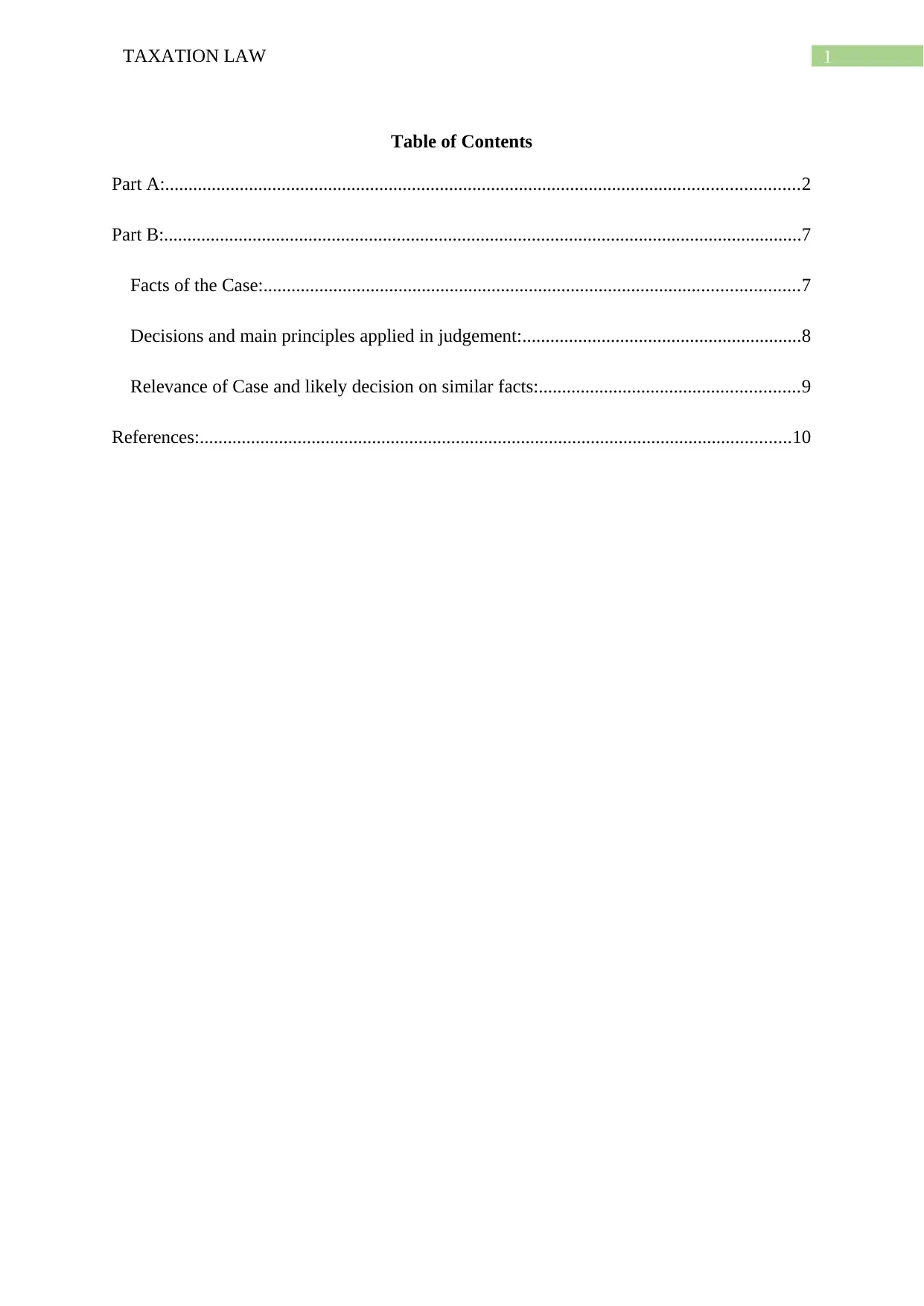
1TAXATION LAW
Table of Contents
Part A:........................................................................................................................................2
Part B:.........................................................................................................................................7
Facts of the Case:...................................................................................................................7
Decisions and main principles applied in judgement:............................................................8
Relevance of Case and likely decision on similar facts:........................................................9
References:...............................................................................................................................10
Table of Contents
Part A:........................................................................................................................................2
Part B:.........................................................................................................................................7
Facts of the Case:...................................................................................................................7
Decisions and main principles applied in judgement:............................................................8
Relevance of Case and likely decision on similar facts:........................................................9
References:...............................................................................................................................10
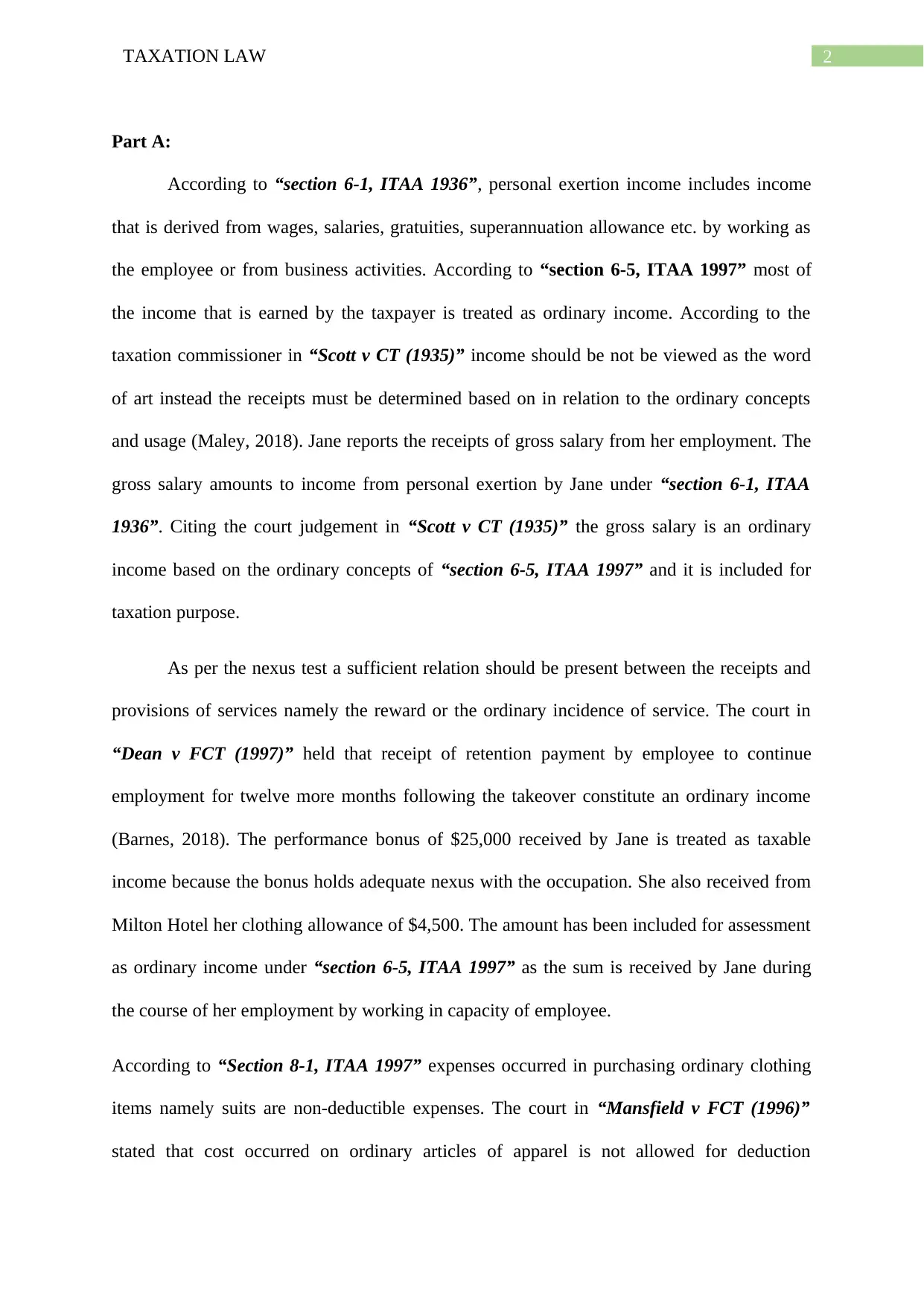
2TAXATION LAW
Part A:
According to “section 6-1, ITAA 1936”, personal exertion income includes income
that is derived from wages, salaries, gratuities, superannuation allowance etc. by working as
the employee or from business activities. According to “section 6-5, ITAA 1997” most of
the income that is earned by the taxpayer is treated as ordinary income. According to the
taxation commissioner in “Scott v CT (1935)” income should be not be viewed as the word
of art instead the receipts must be determined based on in relation to the ordinary concepts
and usage (Maley, 2018). Jane reports the receipts of gross salary from her employment. The
gross salary amounts to income from personal exertion by Jane under “section 6-1, ITAA
1936”. Citing the court judgement in “Scott v CT (1935)” the gross salary is an ordinary
income based on the ordinary concepts of “section 6-5, ITAA 1997” and it is included for
taxation purpose.
As per the nexus test a sufficient relation should be present between the receipts and
provisions of services namely the reward or the ordinary incidence of service. The court in
“Dean v FCT (1997)” held that receipt of retention payment by employee to continue
employment for twelve more months following the takeover constitute an ordinary income
(Barnes, 2018). The performance bonus of $25,000 received by Jane is treated as taxable
income because the bonus holds adequate nexus with the occupation. She also received from
Milton Hotel her clothing allowance of $4,500. The amount has been included for assessment
as ordinary income under “section 6-5, ITAA 1997” as the sum is received by Jane during
the course of her employment by working in capacity of employee.
According to “Section 8-1, ITAA 1997” expenses occurred in purchasing ordinary clothing
items namely suits are non-deductible expenses. The court in “Mansfield v FCT (1996)”
stated that cost occurred on ordinary articles of apparel is not allowed for deduction
Part A:
According to “section 6-1, ITAA 1936”, personal exertion income includes income
that is derived from wages, salaries, gratuities, superannuation allowance etc. by working as
the employee or from business activities. According to “section 6-5, ITAA 1997” most of
the income that is earned by the taxpayer is treated as ordinary income. According to the
taxation commissioner in “Scott v CT (1935)” income should be not be viewed as the word
of art instead the receipts must be determined based on in relation to the ordinary concepts
and usage (Maley, 2018). Jane reports the receipts of gross salary from her employment. The
gross salary amounts to income from personal exertion by Jane under “section 6-1, ITAA
1936”. Citing the court judgement in “Scott v CT (1935)” the gross salary is an ordinary
income based on the ordinary concepts of “section 6-5, ITAA 1997” and it is included for
taxation purpose.
As per the nexus test a sufficient relation should be present between the receipts and
provisions of services namely the reward or the ordinary incidence of service. The court in
“Dean v FCT (1997)” held that receipt of retention payment by employee to continue
employment for twelve more months following the takeover constitute an ordinary income
(Barnes, 2018). The performance bonus of $25,000 received by Jane is treated as taxable
income because the bonus holds adequate nexus with the occupation. She also received from
Milton Hotel her clothing allowance of $4,500. The amount has been included for assessment
as ordinary income under “section 6-5, ITAA 1997” as the sum is received by Jane during
the course of her employment by working in capacity of employee.
According to “Section 8-1, ITAA 1997” expenses occurred in purchasing ordinary clothing
items namely suits are non-deductible expenses. The court in “Mansfield v FCT (1996)”
stated that cost occurred on ordinary articles of apparel is not allowed for deduction
⊘ This is a preview!⊘
Do you want full access?
Subscribe today to unlock all pages.

Trusted by 1+ million students worldwide
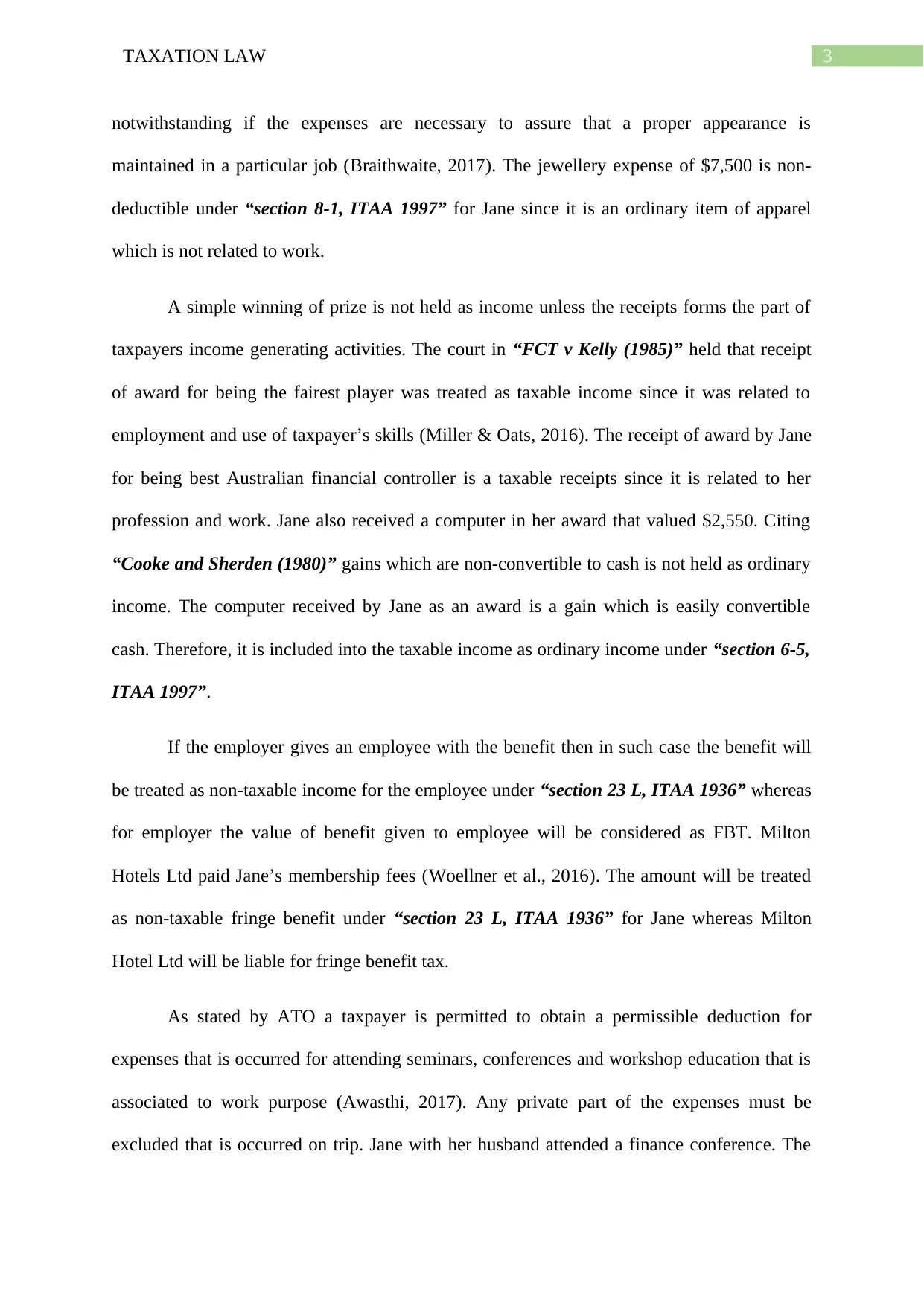
3TAXATION LAW
notwithstanding if the expenses are necessary to assure that a proper appearance is
maintained in a particular job (Braithwaite, 2017). The jewellery expense of $7,500 is non-
deductible under “section 8-1, ITAA 1997” for Jane since it is an ordinary item of apparel
which is not related to work.
A simple winning of prize is not held as income unless the receipts forms the part of
taxpayers income generating activities. The court in “FCT v Kelly (1985)” held that receipt
of award for being the fairest player was treated as taxable income since it was related to
employment and use of taxpayer’s skills (Miller & Oats, 2016). The receipt of award by Jane
for being best Australian financial controller is a taxable receipts since it is related to her
profession and work. Jane also received a computer in her award that valued $2,550. Citing
“Cooke and Sherden (1980)” gains which are non-convertible to cash is not held as ordinary
income. The computer received by Jane as an award is a gain which is easily convertible
cash. Therefore, it is included into the taxable income as ordinary income under “section 6-5,
ITAA 1997”.
If the employer gives an employee with the benefit then in such case the benefit will
be treated as non-taxable income for the employee under “section 23 L, ITAA 1936” whereas
for employer the value of benefit given to employee will be considered as FBT. Milton
Hotels Ltd paid Jane’s membership fees (Woellner et al., 2016). The amount will be treated
as non-taxable fringe benefit under “section 23 L, ITAA 1936” for Jane whereas Milton
Hotel Ltd will be liable for fringe benefit tax.
As stated by ATO a taxpayer is permitted to obtain a permissible deduction for
expenses that is occurred for attending seminars, conferences and workshop education that is
associated to work purpose (Awasthi, 2017). Any private part of the expenses must be
excluded that is occurred on trip. Jane with her husband attended a finance conference. The
notwithstanding if the expenses are necessary to assure that a proper appearance is
maintained in a particular job (Braithwaite, 2017). The jewellery expense of $7,500 is non-
deductible under “section 8-1, ITAA 1997” for Jane since it is an ordinary item of apparel
which is not related to work.
A simple winning of prize is not held as income unless the receipts forms the part of
taxpayers income generating activities. The court in “FCT v Kelly (1985)” held that receipt
of award for being the fairest player was treated as taxable income since it was related to
employment and use of taxpayer’s skills (Miller & Oats, 2016). The receipt of award by Jane
for being best Australian financial controller is a taxable receipts since it is related to her
profession and work. Jane also received a computer in her award that valued $2,550. Citing
“Cooke and Sherden (1980)” gains which are non-convertible to cash is not held as ordinary
income. The computer received by Jane as an award is a gain which is easily convertible
cash. Therefore, it is included into the taxable income as ordinary income under “section 6-5,
ITAA 1997”.
If the employer gives an employee with the benefit then in such case the benefit will
be treated as non-taxable income for the employee under “section 23 L, ITAA 1936” whereas
for employer the value of benefit given to employee will be considered as FBT. Milton
Hotels Ltd paid Jane’s membership fees (Woellner et al., 2016). The amount will be treated
as non-taxable fringe benefit under “section 23 L, ITAA 1936” for Jane whereas Milton
Hotel Ltd will be liable for fringe benefit tax.
As stated by ATO a taxpayer is permitted to obtain a permissible deduction for
expenses that is occurred for attending seminars, conferences and workshop education that is
associated to work purpose (Awasthi, 2017). Any private part of the expenses must be
excluded that is occurred on trip. Jane with her husband attended a finance conference. The
Paraphrase This Document
Need a fresh take? Get an instant paraphrase of this document with our AI Paraphraser
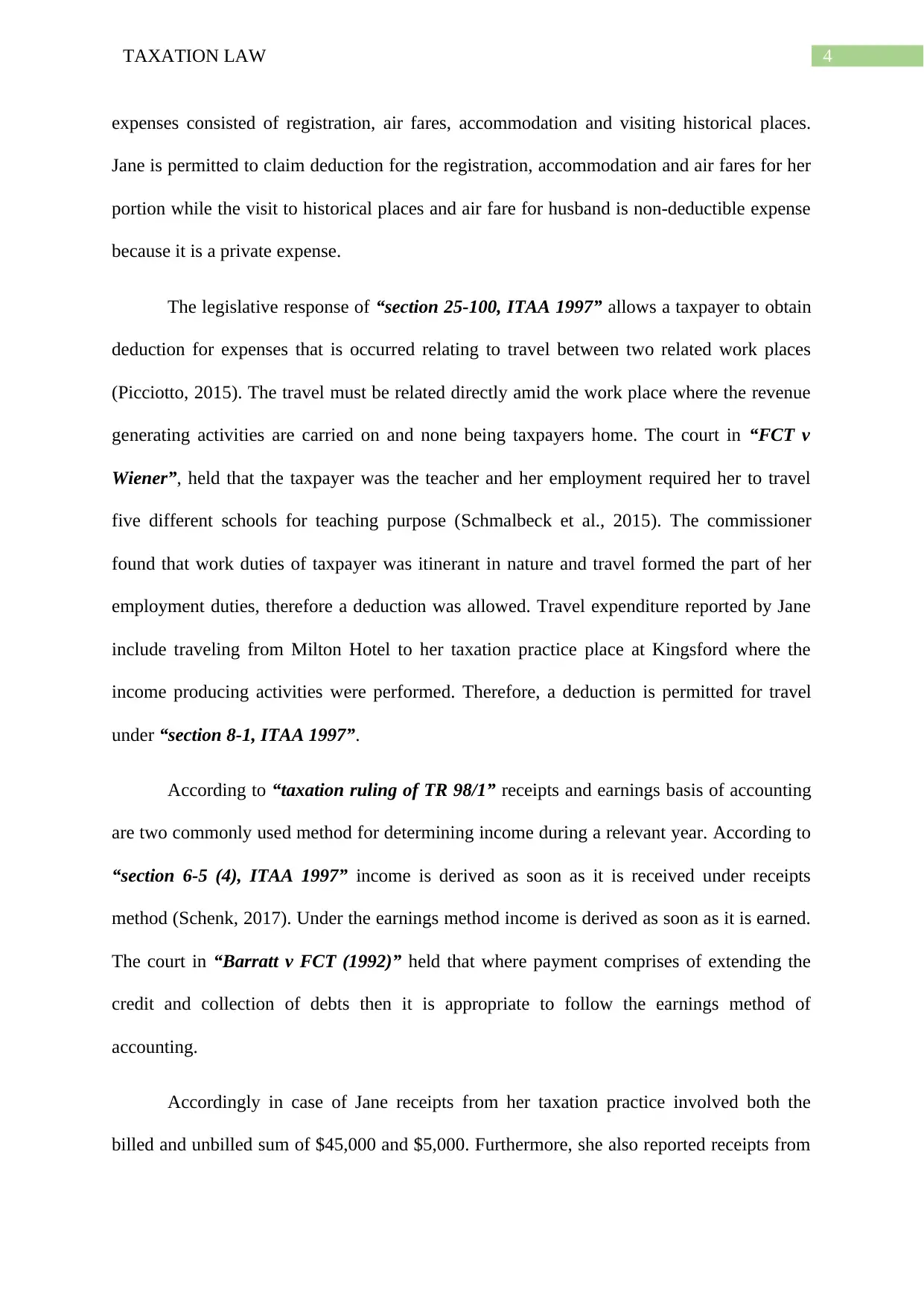
4TAXATION LAW
expenses consisted of registration, air fares, accommodation and visiting historical places.
Jane is permitted to claim deduction for the registration, accommodation and air fares for her
portion while the visit to historical places and air fare for husband is non-deductible expense
because it is a private expense.
The legislative response of “section 25-100, ITAA 1997” allows a taxpayer to obtain
deduction for expenses that is occurred relating to travel between two related work places
(Picciotto, 2015). The travel must be related directly amid the work place where the revenue
generating activities are carried on and none being taxpayers home. The court in “FCT v
Wiener”, held that the taxpayer was the teacher and her employment required her to travel
five different schools for teaching purpose (Schmalbeck et al., 2015). The commissioner
found that work duties of taxpayer was itinerant in nature and travel formed the part of her
employment duties, therefore a deduction was allowed. Travel expenditure reported by Jane
include traveling from Milton Hotel to her taxation practice place at Kingsford where the
income producing activities were performed. Therefore, a deduction is permitted for travel
under “section 8-1, ITAA 1997”.
According to “taxation ruling of TR 98/1” receipts and earnings basis of accounting
are two commonly used method for determining income during a relevant year. According to
“section 6-5 (4), ITAA 1997” income is derived as soon as it is received under receipts
method (Schenk, 2017). Under the earnings method income is derived as soon as it is earned.
The court in “Barratt v FCT (1992)” held that where payment comprises of extending the
credit and collection of debts then it is appropriate to follow the earnings method of
accounting.
Accordingly in case of Jane receipts from her taxation practice involved both the
billed and unbilled sum of $45,000 and $5,000. Furthermore, she also reported receipts from
expenses consisted of registration, air fares, accommodation and visiting historical places.
Jane is permitted to claim deduction for the registration, accommodation and air fares for her
portion while the visit to historical places and air fare for husband is non-deductible expense
because it is a private expense.
The legislative response of “section 25-100, ITAA 1997” allows a taxpayer to obtain
deduction for expenses that is occurred relating to travel between two related work places
(Picciotto, 2015). The travel must be related directly amid the work place where the revenue
generating activities are carried on and none being taxpayers home. The court in “FCT v
Wiener”, held that the taxpayer was the teacher and her employment required her to travel
five different schools for teaching purpose (Schmalbeck et al., 2015). The commissioner
found that work duties of taxpayer was itinerant in nature and travel formed the part of her
employment duties, therefore a deduction was allowed. Travel expenditure reported by Jane
include traveling from Milton Hotel to her taxation practice place at Kingsford where the
income producing activities were performed. Therefore, a deduction is permitted for travel
under “section 8-1, ITAA 1997”.
According to “taxation ruling of TR 98/1” receipts and earnings basis of accounting
are two commonly used method for determining income during a relevant year. According to
“section 6-5 (4), ITAA 1997” income is derived as soon as it is received under receipts
method (Schenk, 2017). Under the earnings method income is derived as soon as it is earned.
The court in “Barratt v FCT (1992)” held that where payment comprises of extending the
credit and collection of debts then it is appropriate to follow the earnings method of
accounting.
Accordingly in case of Jane receipts from her taxation practice involved both the
billed and unbilled sum of $45,000 and $5,000. Furthermore, she also reported receipts from
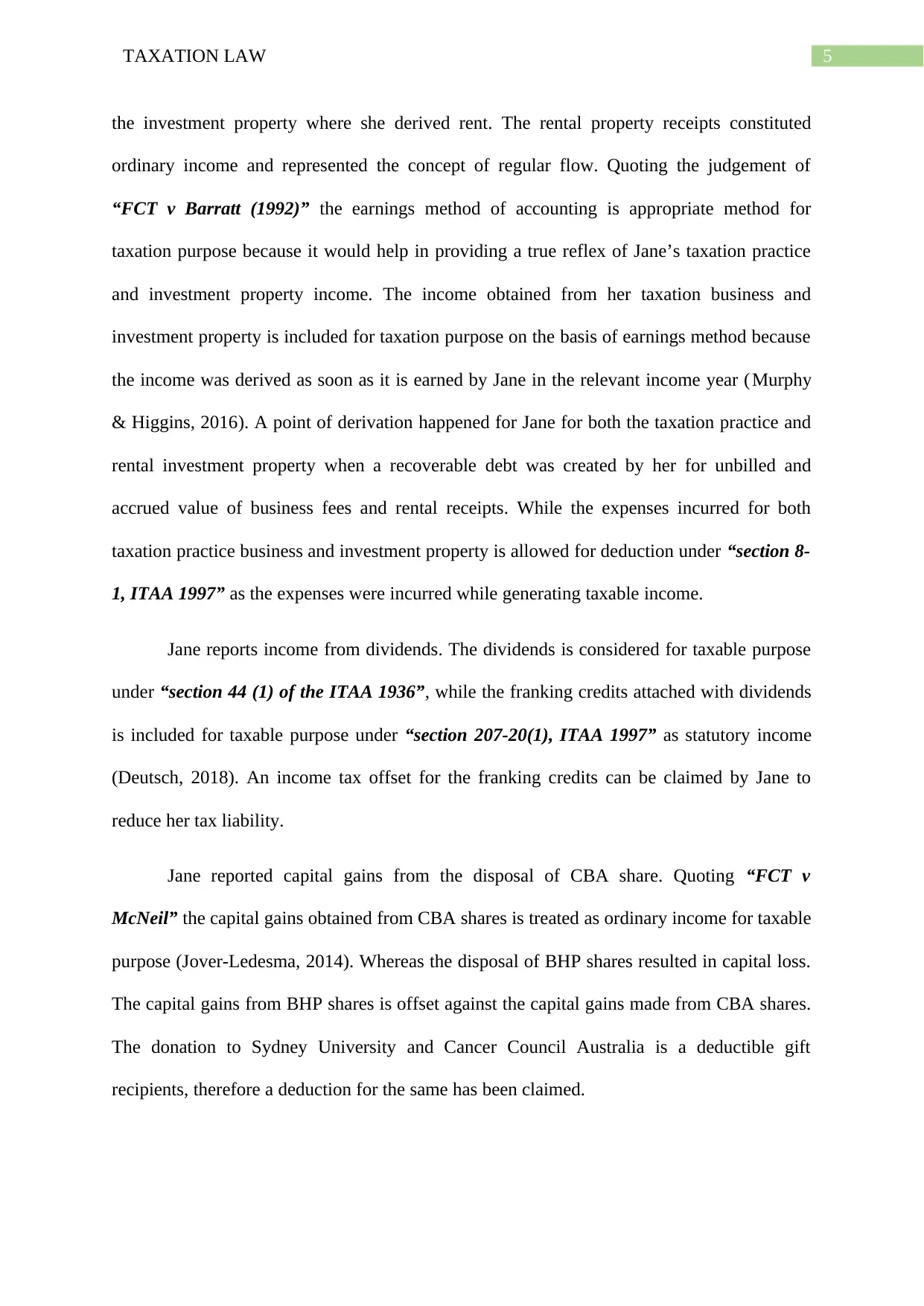
5TAXATION LAW
the investment property where she derived rent. The rental property receipts constituted
ordinary income and represented the concept of regular flow. Quoting the judgement of
“FCT v Barratt (1992)” the earnings method of accounting is appropriate method for
taxation purpose because it would help in providing a true reflex of Jane’s taxation practice
and investment property income. The income obtained from her taxation business and
investment property is included for taxation purpose on the basis of earnings method because
the income was derived as soon as it is earned by Jane in the relevant income year (Murphy
& Higgins, 2016). A point of derivation happened for Jane for both the taxation practice and
rental investment property when a recoverable debt was created by her for unbilled and
accrued value of business fees and rental receipts. While the expenses incurred for both
taxation practice business and investment property is allowed for deduction under “section 8-
1, ITAA 1997” as the expenses were incurred while generating taxable income.
Jane reports income from dividends. The dividends is considered for taxable purpose
under “section 44 (1) of the ITAA 1936”, while the franking credits attached with dividends
is included for taxable purpose under “section 207-20(1), ITAA 1997” as statutory income
(Deutsch, 2018). An income tax offset for the franking credits can be claimed by Jane to
reduce her tax liability.
Jane reported capital gains from the disposal of CBA share. Quoting “FCT v
McNeil” the capital gains obtained from CBA shares is treated as ordinary income for taxable
purpose (Jover-Ledesma, 2014). Whereas the disposal of BHP shares resulted in capital loss.
The capital gains from BHP shares is offset against the capital gains made from CBA shares.
The donation to Sydney University and Cancer Council Australia is a deductible gift
recipients, therefore a deduction for the same has been claimed.
the investment property where she derived rent. The rental property receipts constituted
ordinary income and represented the concept of regular flow. Quoting the judgement of
“FCT v Barratt (1992)” the earnings method of accounting is appropriate method for
taxation purpose because it would help in providing a true reflex of Jane’s taxation practice
and investment property income. The income obtained from her taxation business and
investment property is included for taxation purpose on the basis of earnings method because
the income was derived as soon as it is earned by Jane in the relevant income year (Murphy
& Higgins, 2016). A point of derivation happened for Jane for both the taxation practice and
rental investment property when a recoverable debt was created by her for unbilled and
accrued value of business fees and rental receipts. While the expenses incurred for both
taxation practice business and investment property is allowed for deduction under “section 8-
1, ITAA 1997” as the expenses were incurred while generating taxable income.
Jane reports income from dividends. The dividends is considered for taxable purpose
under “section 44 (1) of the ITAA 1936”, while the franking credits attached with dividends
is included for taxable purpose under “section 207-20(1), ITAA 1997” as statutory income
(Deutsch, 2018). An income tax offset for the franking credits can be claimed by Jane to
reduce her tax liability.
Jane reported capital gains from the disposal of CBA share. Quoting “FCT v
McNeil” the capital gains obtained from CBA shares is treated as ordinary income for taxable
purpose (Jover-Ledesma, 2014). Whereas the disposal of BHP shares resulted in capital loss.
The capital gains from BHP shares is offset against the capital gains made from CBA shares.
The donation to Sydney University and Cancer Council Australia is a deductible gift
recipients, therefore a deduction for the same has been claimed.
⊘ This is a preview!⊘
Do you want full access?
Subscribe today to unlock all pages.

Trusted by 1+ million students worldwide
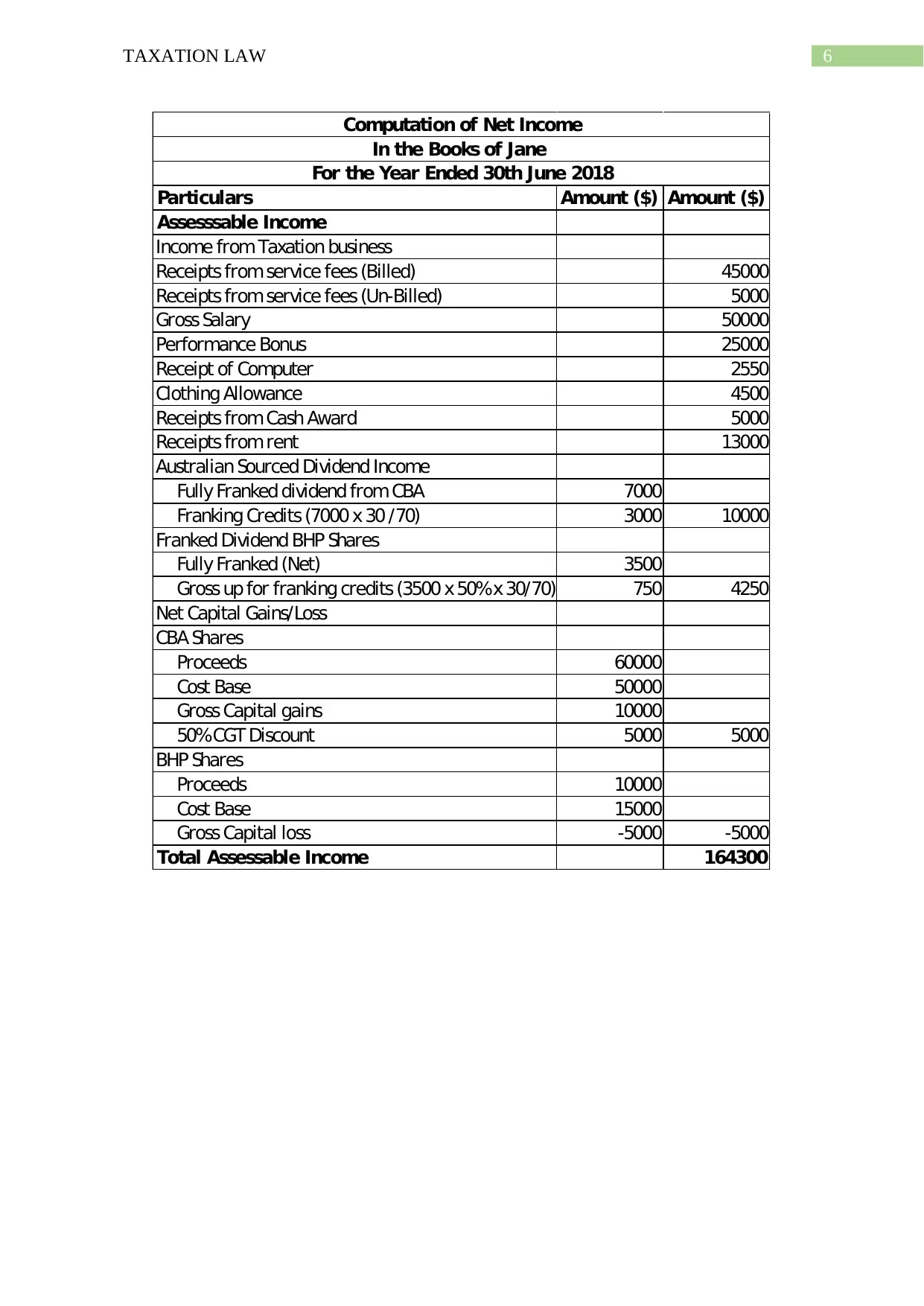
6TAXATION LAW
Particulars Amount ($) Amount ($)
Assesssable Income
Income from Taxation business
Receipts from service fees (Billed) 45000
Receipts from service fees (Un-Billed) 5000
Gross Salary 50000
Performance Bonus 25000
Receipt of Computer 2550
Clothing Allowance 4500
Receipts from Cash Award 5000
Receipts from rent 13000
Australian Sourced Dividend Income
Fully Franked dividend from CBA 7000
Franking Credits (7000 x 30 /70) 3000 10000
Franked Dividend BHP Shares
Fully Franked (Net) 3500
Gross up for franking credits (3500 x 50%x 30/70) 750 4250
Net Capital Gains/Loss
CBA Shares
Proceeds 60000
Cost Base 50000
Gross Capital gains 10000
50%CGT Discount 5000 5000
BHP Shares
Proceeds 10000
Cost Base 15000
Gross Capital loss -5000 -5000
Total Assessable Income 164300
Computation of Net Income
In the Books of Jane
For the Year Ended 30th June 2018
Particulars Amount ($) Amount ($)
Assesssable Income
Income from Taxation business
Receipts from service fees (Billed) 45000
Receipts from service fees (Un-Billed) 5000
Gross Salary 50000
Performance Bonus 25000
Receipt of Computer 2550
Clothing Allowance 4500
Receipts from Cash Award 5000
Receipts from rent 13000
Australian Sourced Dividend Income
Fully Franked dividend from CBA 7000
Franking Credits (7000 x 30 /70) 3000 10000
Franked Dividend BHP Shares
Fully Franked (Net) 3500
Gross up for franking credits (3500 x 50%x 30/70) 750 4250
Net Capital Gains/Loss
CBA Shares
Proceeds 60000
Cost Base 50000
Gross Capital gains 10000
50%CGT Discount 5000 5000
BHP Shares
Proceeds 10000
Cost Base 15000
Gross Capital loss -5000 -5000
Total Assessable Income 164300
Computation of Net Income
In the Books of Jane
For the Year Ended 30th June 2018
Paraphrase This Document
Need a fresh take? Get an instant paraphrase of this document with our AI Paraphraser
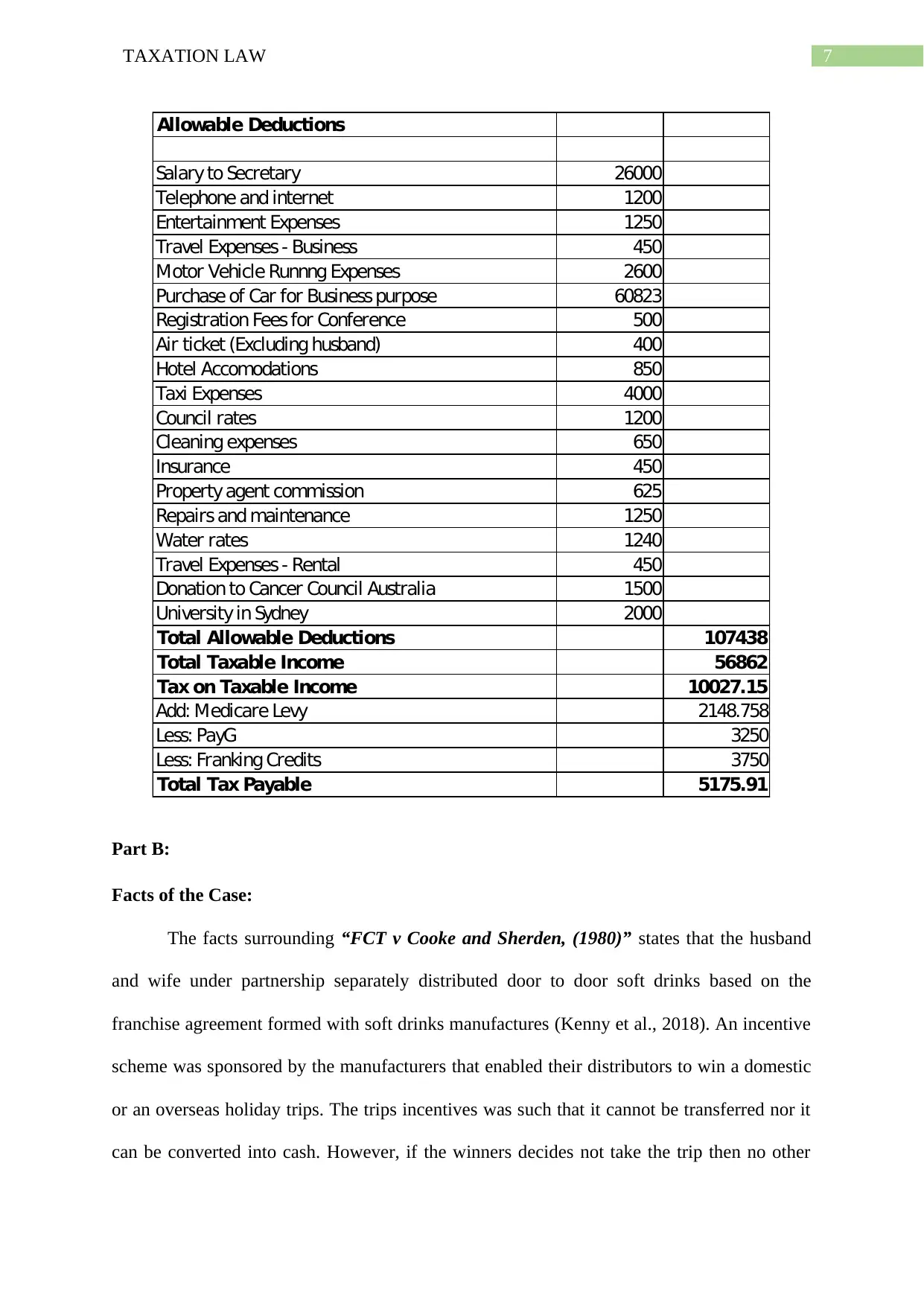
7TAXATION LAW
Allowable Deductions
Salary to Secretary 26000
Telephone and internet 1200
Entertainment Expenses 1250
Travel Expenses - Business 450
Motor Vehicle Runnng Expenses 2600
Purchase of Car for Business purpose 60823
Registration Fees for Conference 500
Air ticket (Excluding husband) 400
Hotel Accomodations 850
Taxi Expenses 4000
Council rates 1200
Cleaning expenses 650
Insurance 450
Property agent commission 625
Repairs and maintenance 1250
Water rates 1240
Travel Expenses - Rental 450
Donation to Cancer Council Australia 1500
University in Sydney 2000
Total Allowable Deductions 107438
Total Taxable Income 56862
Tax on Taxable Income 10027.15
Add: Medicare Levy 2148.758
Less: PayG 3250
Less: Franking Credits 3750
Total Tax Payable 5175.91
Part B:
Facts of the Case:
The facts surrounding “FCT v Cooke and Sherden, (1980)” states that the husband
and wife under partnership separately distributed door to door soft drinks based on the
franchise agreement formed with soft drinks manufactures (Kenny et al., 2018). An incentive
scheme was sponsored by the manufacturers that enabled their distributors to win a domestic
or an overseas holiday trips. The trips incentives was such that it cannot be transferred nor it
can be converted into cash. However, if the winners decides not take the trip then no other
Allowable Deductions
Salary to Secretary 26000
Telephone and internet 1200
Entertainment Expenses 1250
Travel Expenses - Business 450
Motor Vehicle Runnng Expenses 2600
Purchase of Car for Business purpose 60823
Registration Fees for Conference 500
Air ticket (Excluding husband) 400
Hotel Accomodations 850
Taxi Expenses 4000
Council rates 1200
Cleaning expenses 650
Insurance 450
Property agent commission 625
Repairs and maintenance 1250
Water rates 1240
Travel Expenses - Rental 450
Donation to Cancer Council Australia 1500
University in Sydney 2000
Total Allowable Deductions 107438
Total Taxable Income 56862
Tax on Taxable Income 10027.15
Add: Medicare Levy 2148.758
Less: PayG 3250
Less: Franking Credits 3750
Total Tax Payable 5175.91
Part B:
Facts of the Case:
The facts surrounding “FCT v Cooke and Sherden, (1980)” states that the husband
and wife under partnership separately distributed door to door soft drinks based on the
franchise agreement formed with soft drinks manufactures (Kenny et al., 2018). An incentive
scheme was sponsored by the manufacturers that enabled their distributors to win a domestic
or an overseas holiday trips. The trips incentives was such that it cannot be transferred nor it
can be converted into cash. However, if the winners decides not take the trip then no other
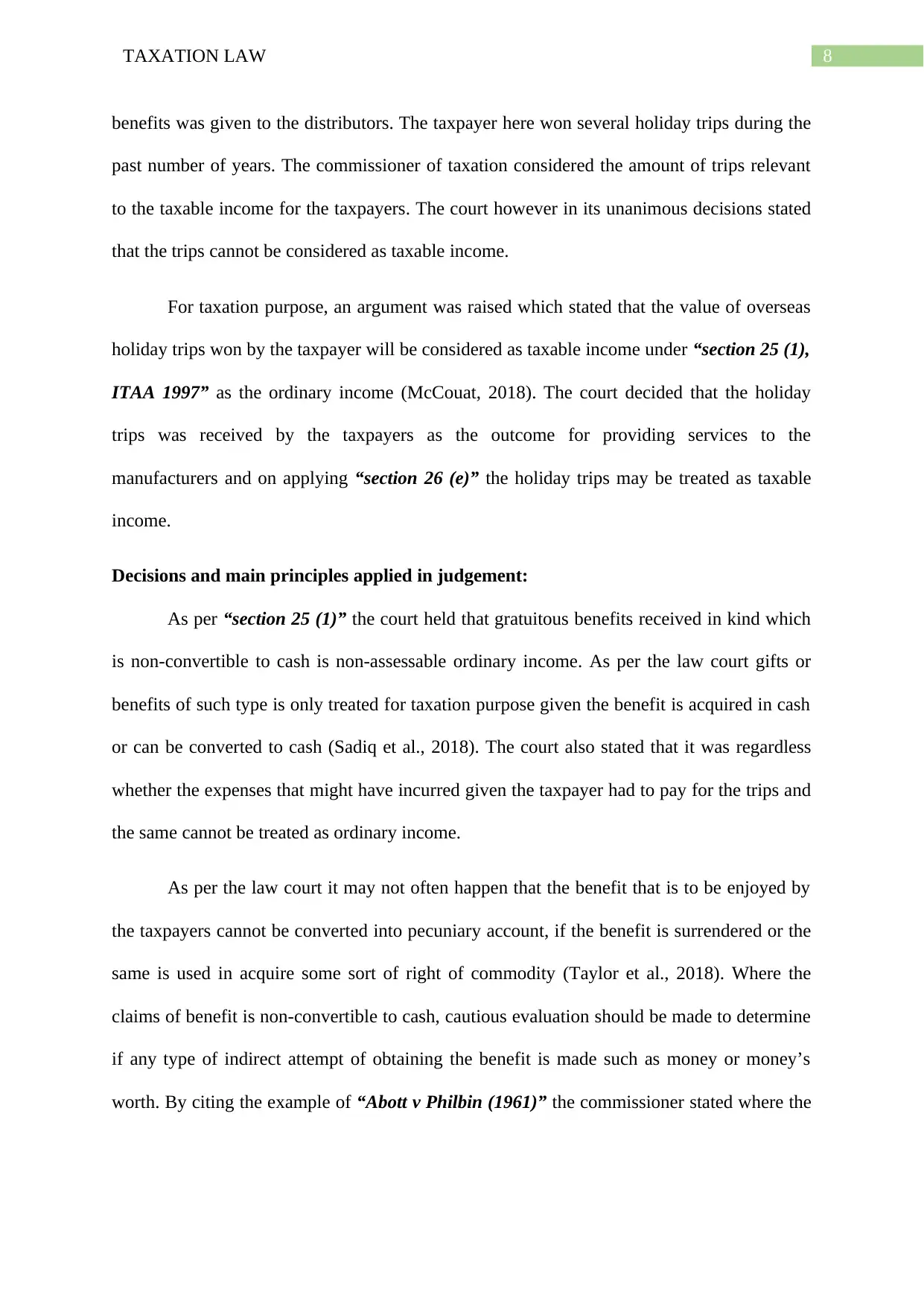
8TAXATION LAW
benefits was given to the distributors. The taxpayer here won several holiday trips during the
past number of years. The commissioner of taxation considered the amount of trips relevant
to the taxable income for the taxpayers. The court however in its unanimous decisions stated
that the trips cannot be considered as taxable income.
For taxation purpose, an argument was raised which stated that the value of overseas
holiday trips won by the taxpayer will be considered as taxable income under “section 25 (1),
ITAA 1997” as the ordinary income (McCouat, 2018). The court decided that the holiday
trips was received by the taxpayers as the outcome for providing services to the
manufacturers and on applying “section 26 (e)” the holiday trips may be treated as taxable
income.
Decisions and main principles applied in judgement:
As per “section 25 (1)” the court held that gratuitous benefits received in kind which
is non-convertible to cash is non-assessable ordinary income. As per the law court gifts or
benefits of such type is only treated for taxation purpose given the benefit is acquired in cash
or can be converted to cash (Sadiq et al., 2018). The court also stated that it was regardless
whether the expenses that might have incurred given the taxpayer had to pay for the trips and
the same cannot be treated as ordinary income.
As per the law court it may not often happen that the benefit that is to be enjoyed by
the taxpayers cannot be converted into pecuniary account, if the benefit is surrendered or the
same is used in acquire some sort of right of commodity (Taylor et al., 2018). Where the
claims of benefit is non-convertible to cash, cautious evaluation should be made to determine
if any type of indirect attempt of obtaining the benefit is made such as money or money’s
worth. By citing the example of “Abott v Philbin (1961)” the commissioner stated where the
benefits was given to the distributors. The taxpayer here won several holiday trips during the
past number of years. The commissioner of taxation considered the amount of trips relevant
to the taxable income for the taxpayers. The court however in its unanimous decisions stated
that the trips cannot be considered as taxable income.
For taxation purpose, an argument was raised which stated that the value of overseas
holiday trips won by the taxpayer will be considered as taxable income under “section 25 (1),
ITAA 1997” as the ordinary income (McCouat, 2018). The court decided that the holiday
trips was received by the taxpayers as the outcome for providing services to the
manufacturers and on applying “section 26 (e)” the holiday trips may be treated as taxable
income.
Decisions and main principles applied in judgement:
As per “section 25 (1)” the court held that gratuitous benefits received in kind which
is non-convertible to cash is non-assessable ordinary income. As per the law court gifts or
benefits of such type is only treated for taxation purpose given the benefit is acquired in cash
or can be converted to cash (Sadiq et al., 2018). The court also stated that it was regardless
whether the expenses that might have incurred given the taxpayer had to pay for the trips and
the same cannot be treated as ordinary income.
As per the law court it may not often happen that the benefit that is to be enjoyed by
the taxpayers cannot be converted into pecuniary account, if the benefit is surrendered or the
same is used in acquire some sort of right of commodity (Taylor et al., 2018). Where the
claims of benefit is non-convertible to cash, cautious evaluation should be made to determine
if any type of indirect attempt of obtaining the benefit is made such as money or money’s
worth. By citing the example of “Abott v Philbin (1961)” the commissioner stated where the
⊘ This is a preview!⊘
Do you want full access?
Subscribe today to unlock all pages.

Trusted by 1+ million students worldwide
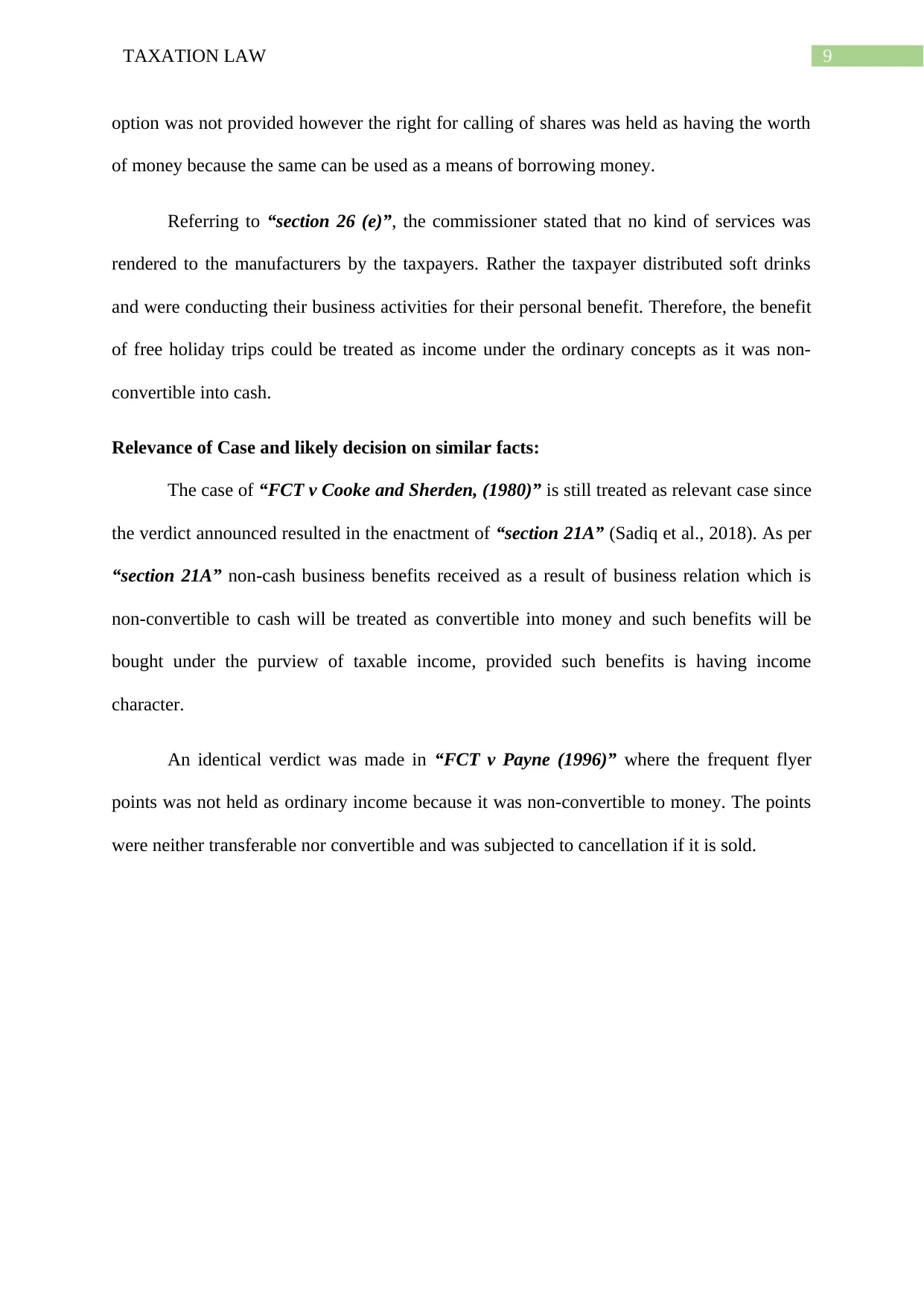
9TAXATION LAW
option was not provided however the right for calling of shares was held as having the worth
of money because the same can be used as a means of borrowing money.
Referring to “section 26 (e)”, the commissioner stated that no kind of services was
rendered to the manufacturers by the taxpayers. Rather the taxpayer distributed soft drinks
and were conducting their business activities for their personal benefit. Therefore, the benefit
of free holiday trips could be treated as income under the ordinary concepts as it was non-
convertible into cash.
Relevance of Case and likely decision on similar facts:
The case of “FCT v Cooke and Sherden, (1980)” is still treated as relevant case since
the verdict announced resulted in the enactment of “section 21A” (Sadiq et al., 2018). As per
“section 21A” non-cash business benefits received as a result of business relation which is
non-convertible to cash will be treated as convertible into money and such benefits will be
bought under the purview of taxable income, provided such benefits is having income
character.
An identical verdict was made in “FCT v Payne (1996)” where the frequent flyer
points was not held as ordinary income because it was non-convertible to money. The points
were neither transferable nor convertible and was subjected to cancellation if it is sold.
option was not provided however the right for calling of shares was held as having the worth
of money because the same can be used as a means of borrowing money.
Referring to “section 26 (e)”, the commissioner stated that no kind of services was
rendered to the manufacturers by the taxpayers. Rather the taxpayer distributed soft drinks
and were conducting their business activities for their personal benefit. Therefore, the benefit
of free holiday trips could be treated as income under the ordinary concepts as it was non-
convertible into cash.
Relevance of Case and likely decision on similar facts:
The case of “FCT v Cooke and Sherden, (1980)” is still treated as relevant case since
the verdict announced resulted in the enactment of “section 21A” (Sadiq et al., 2018). As per
“section 21A” non-cash business benefits received as a result of business relation which is
non-convertible to cash will be treated as convertible into money and such benefits will be
bought under the purview of taxable income, provided such benefits is having income
character.
An identical verdict was made in “FCT v Payne (1996)” where the frequent flyer
points was not held as ordinary income because it was non-convertible to money. The points
were neither transferable nor convertible and was subjected to cancellation if it is sold.
Paraphrase This Document
Need a fresh take? Get an instant paraphrase of this document with our AI Paraphraser
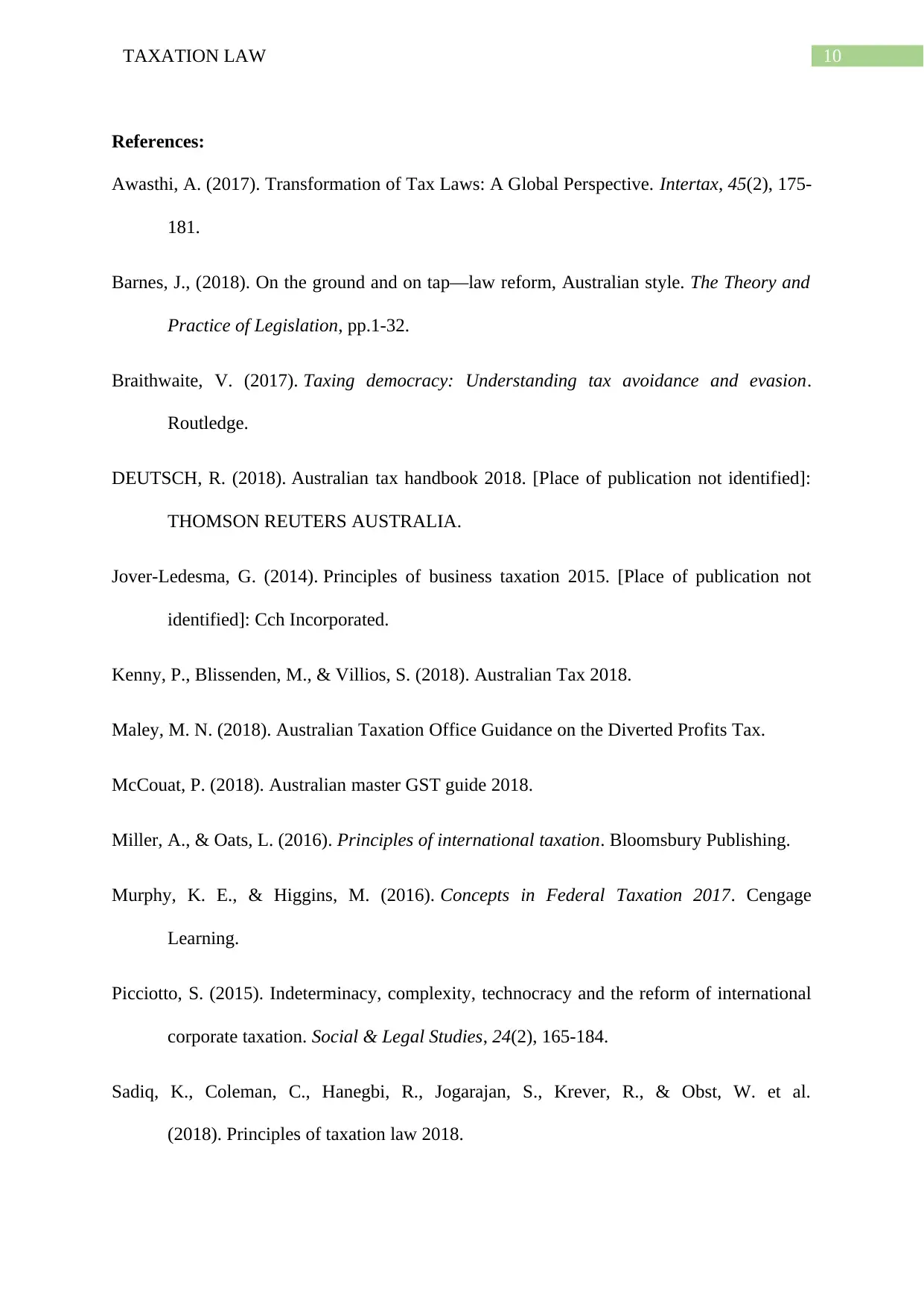
10TAXATION LAW
References:
Awasthi, A. (2017). Transformation of Tax Laws: A Global Perspective. Intertax, 45(2), 175-
181.
Barnes, J., (2018). On the ground and on tap—law reform, Australian style. The Theory and
Practice of Legislation, pp.1-32.
Braithwaite, V. (2017). Taxing democracy: Understanding tax avoidance and evasion.
Routledge.
DEUTSCH, R. (2018). Australian tax handbook 2018. [Place of publication not identified]:
THOMSON REUTERS AUSTRALIA.
Jover-Ledesma, G. (2014). Principles of business taxation 2015. [Place of publication not
identified]: Cch Incorporated.
Kenny, P., Blissenden, M., & Villios, S. (2018). Australian Tax 2018.
Maley, M. N. (2018). Australian Taxation Office Guidance on the Diverted Profits Tax.
McCouat, P. (2018). Australian master GST guide 2018.
Miller, A., & Oats, L. (2016). Principles of international taxation. Bloomsbury Publishing.
Murphy, K. E., & Higgins, M. (2016). Concepts in Federal Taxation 2017. Cengage
Learning.
Picciotto, S. (2015). Indeterminacy, complexity, technocracy and the reform of international
corporate taxation. Social & Legal Studies, 24(2), 165-184.
Sadiq, K., Coleman, C., Hanegbi, R., Jogarajan, S., Krever, R., & Obst, W. et al.
(2018). Principles of taxation law 2018.
References:
Awasthi, A. (2017). Transformation of Tax Laws: A Global Perspective. Intertax, 45(2), 175-
181.
Barnes, J., (2018). On the ground and on tap—law reform, Australian style. The Theory and
Practice of Legislation, pp.1-32.
Braithwaite, V. (2017). Taxing democracy: Understanding tax avoidance and evasion.
Routledge.
DEUTSCH, R. (2018). Australian tax handbook 2018. [Place of publication not identified]:
THOMSON REUTERS AUSTRALIA.
Jover-Ledesma, G. (2014). Principles of business taxation 2015. [Place of publication not
identified]: Cch Incorporated.
Kenny, P., Blissenden, M., & Villios, S. (2018). Australian Tax 2018.
Maley, M. N. (2018). Australian Taxation Office Guidance on the Diverted Profits Tax.
McCouat, P. (2018). Australian master GST guide 2018.
Miller, A., & Oats, L. (2016). Principles of international taxation. Bloomsbury Publishing.
Murphy, K. E., & Higgins, M. (2016). Concepts in Federal Taxation 2017. Cengage
Learning.
Picciotto, S. (2015). Indeterminacy, complexity, technocracy and the reform of international
corporate taxation. Social & Legal Studies, 24(2), 165-184.
Sadiq, K., Coleman, C., Hanegbi, R., Jogarajan, S., Krever, R., & Obst, W. et al.
(2018). Principles of taxation law 2018.
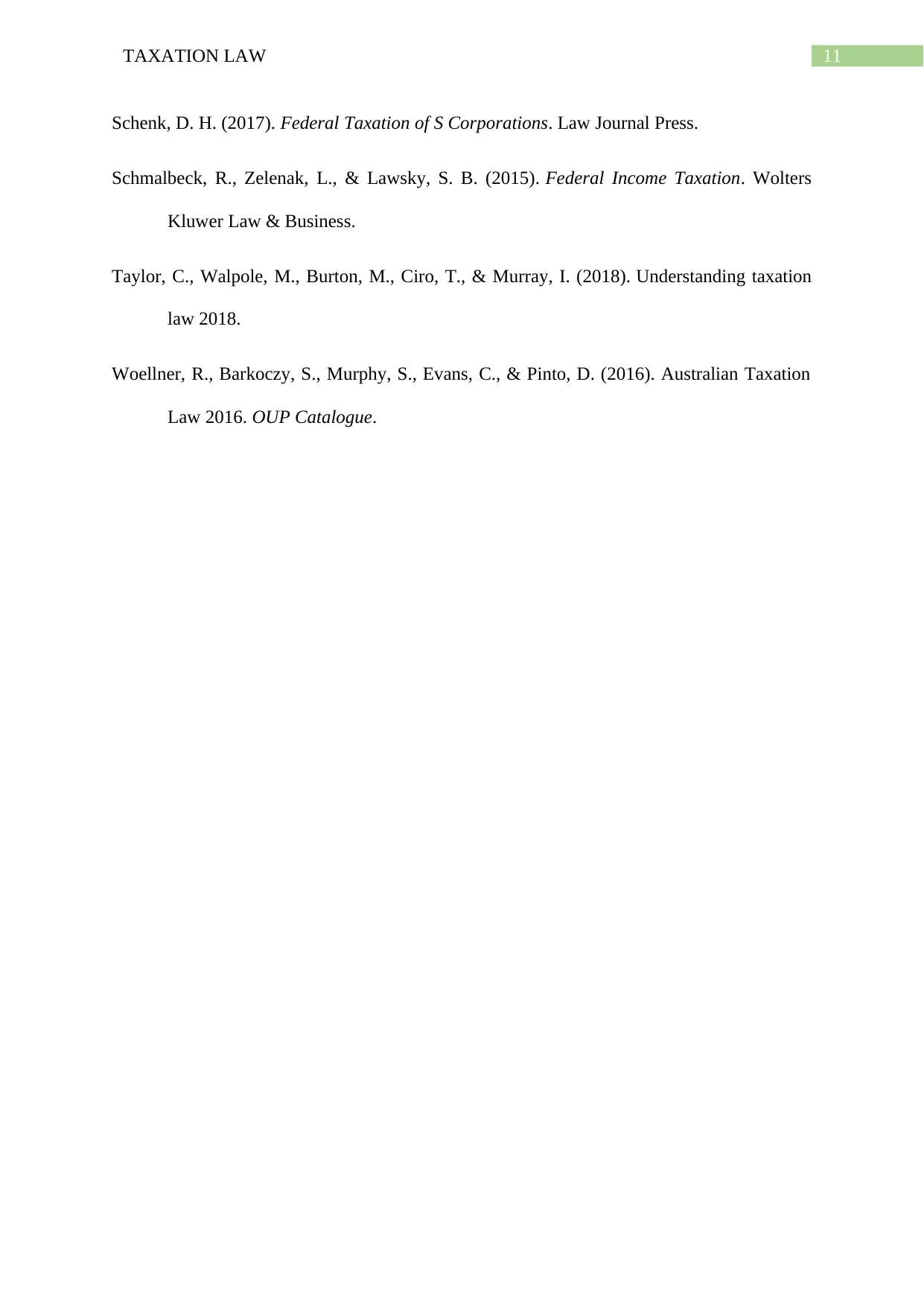
11TAXATION LAW
Schenk, D. H. (2017). Federal Taxation of S Corporations. Law Journal Press.
Schmalbeck, R., Zelenak, L., & Lawsky, S. B. (2015). Federal Income Taxation. Wolters
Kluwer Law & Business.
Taylor, C., Walpole, M., Burton, M., Ciro, T., & Murray, I. (2018). Understanding taxation
law 2018.
Woellner, R., Barkoczy, S., Murphy, S., Evans, C., & Pinto, D. (2016). Australian Taxation
Law 2016. OUP Catalogue.
Schenk, D. H. (2017). Federal Taxation of S Corporations. Law Journal Press.
Schmalbeck, R., Zelenak, L., & Lawsky, S. B. (2015). Federal Income Taxation. Wolters
Kluwer Law & Business.
Taylor, C., Walpole, M., Burton, M., Ciro, T., & Murray, I. (2018). Understanding taxation
law 2018.
Woellner, R., Barkoczy, S., Murphy, S., Evans, C., & Pinto, D. (2016). Australian Taxation
Law 2016. OUP Catalogue.
⊘ This is a preview!⊘
Do you want full access?
Subscribe today to unlock all pages.

Trusted by 1+ million students worldwide
1 out of 12
Related Documents
Your All-in-One AI-Powered Toolkit for Academic Success.
+13062052269
info@desklib.com
Available 24*7 on WhatsApp / Email
![[object Object]](/_next/static/media/star-bottom.7253800d.svg)
Unlock your academic potential
Copyright © 2020–2026 A2Z Services. All Rights Reserved. Developed and managed by ZUCOL.





